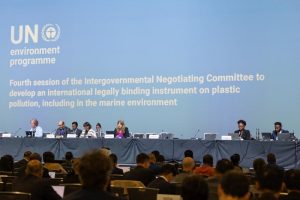“We need to throw away this throw-away culture!”
This statement encapsulated the sentiment driving delegates’ commitment to end plastic pollution as they gathered on Tuesday, April 23, 2024, for the first day of the fourth session of the Intergovernmental Negotiating Committee (INC-4) to develop an international legally binding instrument (ILBI) on plastic pollution, including in the marine environment.

Convening in Ottawa, Canada, delegates met in plenary to hear opening statements, basing additional discussions on the Revised Draft Text of the ILBI.
In opening remarks, INC-4 Chair Luis Vayas Valdivieso, Ecuador, noted the critical role of advancing negotiations to deliver effective and impactful solutions to address plastic pollution, and highlighted the potential economic opportunities from tackling plastic pollution.
Inger Andersen, Executive Director, UN Environment Programme (UNEP), called to end plastic pollution by using less harmful materials, designing for circularity, reusing resources more effectively, ensuring a just transition, and creating a space for private sector to thrive.
Steven Guilbeault, Minister of Environment and Climate Change, Canada, drew attention to the Host Country Alliance to lead conversations on key political issues, and emphasised his country’s pledge of CAD 10 million towards the Global Plastic Action Partnership and CAD 5 million towards the PROBLUE Fund.
Jyoti Mathur-Filipp, Executive Secretary, INC Secretariat, recalled the very ambitious timeline set by UN Environment Assembly (UNEA) resolution 5/14, and pointed to the Revised Draft Text to be considered at INC-4, stating this is “multilateralism at its best.”
In general statements, several delegates highlighted the need to address the entire lifecycle of plastic, while others prioritised addressing only those matters related to plastic waste and plastic waste management.
Several delegations also supported a human rights-based approach to addressing plastic pollution, specifically related to vulnerable communities including waste pickers, and called for the new agreement to ensure a just transition for those working in sectors of the plastic industry that may be affected by the new instrument.
Several delegations also underlined the need for the new instrument to consider the issue of the export of toxic plastic waste, with the African Group lamenting that the practice of international dumping of plastic waste would need to be comprehensively tackled.

Meanwhile, Greenpeace International and the Descendants Project have urged member states to watch out for mischief during negotiations, adding that it is critical that the fourth Intergovernmental Negotiating Committee (INC-4) meeting secures an ambitious Global Plastics Treaty that cuts plastic production and ends single-use plastic.
At a press conference held on Tuesday in Ottawa, Greenpeace Africa demanded four key actions from member states, who were urged to:
- Retain the option for a global target to reduce primary plastic polymer production in the text. Ambitious countries must not concede to bad-faith countries in this area.
- Retain the option for targets for reduction, reuse, and refill in the text.
- Move into the actual negotiation of the treaty text. A first step will be states working to consolidate the many options in the revised Zero Draft.
- Ensure there is a mandate to create the first draft of the treaty text, which was one of the failures of INC3 held last November 2023 in Nairobi, Kenya.
Hellen Kahaso Dena, Project Lead for the Pan-African Plastic Project, said: “The clock is ticking, we are now in the penultimate stage of the treaty negotiations, yet little progress has been made towards tackling this global crisis. We want to see world leaders making real progress on ending plastic pollution by cutting plastic production. Otherwise, we risk ending up with a waste management treaty contrary to UNEA 5/14 resolution to end plastic pollution.”
Highlighting the role of Canada as the host country for this round of talks, Sarah King, Head of Oceans and Plastics Campaigns for Greenpeace Canada, said: “As host country, Canada can show leadership by setting the right tone for the talks ahead and working with other high ambition countries to champion the strongest possible measures. Public calls for bold action are getting louder, and this is Canada’s moment to heed those calls and help move us towards the impactful Plastics Treaty outcome people and the planet desperately need.”
Jo Banner of The Descendants Project said: “As a resident of Louisiana’s Cancer Alley, I experience first-hand the devastating impact plastic production has on the health and environment of frontline communities. A treaty failing to limit plastic production is a continuation of our country’s deadly tradition, which harks back to the days of the enslavement of my ancestors, of enriching others through the sacrificing of Black bodies, other people of colour, and low-income communities.”
Earlier this month, a Greenpeace International poll report revealed that eight out of 10 people support cutting plastic production. The survey, which was conducted across 19 countries indicates overwhelming public backing for measures aimed at ending single-use plastics and promoting reuse-based solutions.
Plastic production and consumption have tremendously increased globally over the past decade reaching unsustainable levels necessitating significant and collective efforts to address the key drivers of plastic pollution. In Africa, Plastics have infiltrated our lives, our streets, body organs, food, soil, ecosystems, and our waterways. To maintain a liveable planet and an equitable future for all, the treaty must cut plastic production by 75% by 2040 and transition to a reuse-based economy.
